A Quote by Jim DeMint
Quantitative easing prints money & causes inflation.
Quote Topics
Related Quotes
I think democracies are prone to inflation because politicians will naturally spend [excessively] - they have the power to print money and will use money to get votes. If you look at inflation under the Roman Empire, with absolute rulers, they had much greater inflation, so we don't set the record. It happens over the long-term under any form of government.
There is no such thing as agflation. Rising commodity prices, or increases in any prices, do not cause inflation. Inflation is what causes prices to rise. Of course, in market economies, prices for individual goods and services rise and fall based on changes in supply and demand, but it is only through inflation that prices rise in aggregate.
The unique aspect of today's monetary inflation is that it is not limited to one country, but a host of countries are all inflating together. As a result of the monetary inflation (when all of the newly created money begins to leave the banks and enter the system), the price inflation will be worldwide.
The loss of quality that is so evident at every level of spectacular language, from the objects it glorifies to the behavior it regulates, stems from the basic nature of a production system that shuns reality. The commodity form reduces everything to quantitative equivalence. The quantitative is what it develops, and it can develop only within the quantitative.

































